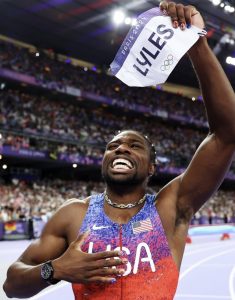August 5, 2024 | AATA National Office
If you’ve been watching the Olympics, you may have shared the feeling of unity and community beyond our geographic borders. The Olympics, and sports more generally, helps unite us across backgrounds and reduces isolation. Whether it’s common passion or an amazing moment on the track, field, or vault—we all feel something together.
Recent Olympic games have Amplified the Importance of Mental Health
“Leading up to Tokyo, I was so nervous about getting injured physically that I kind of neglected my mental health,” U.S. gymnast Simone Biles explained. “I put that on the back burner and then I was injured, except it was a mental injury.”
In response to Simone’s calls for the need to prioritize the mental health of athletes, the International Olympic Committee in 2023 issued an action plan that highlighted how elite athletes are “at increased risk of mental health problems, such as depression, anxiety and eating disorders.”
The 2024 Olympics has moved the conversation about mental health. It also “marks a sea-change in the prioritization of, and dedication to, supporting athletes’ mental health.”
Simone’s Instagram post on August 2, “mental health matters,” garnered more than 3.5 million likes within a few days.
Noah Lyles, who won Olympic gold on Aug. 4—the first gold for Team USA in men’s 100m in the last 20 years—posted about his mental health struggles only hours after his win.


Photo credit: @NoJo18
Team USA is Also Prioritizing Mental Health
The US Olympic & Paralympic Committee (USOPC) grew its mental health program beginning in 2020, according to Jessica Bartley, PsyD, LCSW, CMPC, senior director of psychological services. The program now includes 15 full-time employees and nearly 300 providers on a USOPC Mental Health and Mental Performance Registries. It also offers a 24/7 phone line for coaches, athletes, and staff (also available through a QR code posted at the training centers), and individual and group/team services for mental performance and mental health. In addition, the program regularly screens athletes for mental health concerns through an IOC Sport Mental Health Assessment Tool that asks questions on general sport-related stressors, depression, anxiety, disordered eating, drugs, alcohol, sleep, and trauma. Last year alone, around 1,200 USOPC athletes received mental health services.
Art Therapy Can Help Athletes Too
As key athletes continue talking about mental health, AATA hopes that we as a society can help reduce the stigma to accessing care, including art therapy. Art therapy in particular provides athletes a non-verbal outlet to express emotions, explore personal narratives, and develop coping strategies. Research has also found that art therapy can promote stress management and injury recovery as well.
But you don’t have to be a world-class athlete to prioritize your own mental health and well-being! To find an art therapist near you, visit AATA’s Art Therapist Locator.
